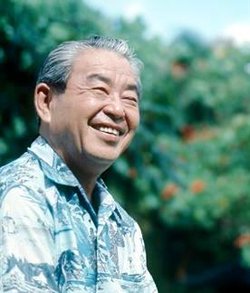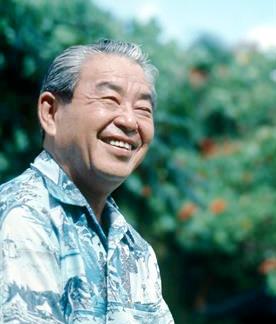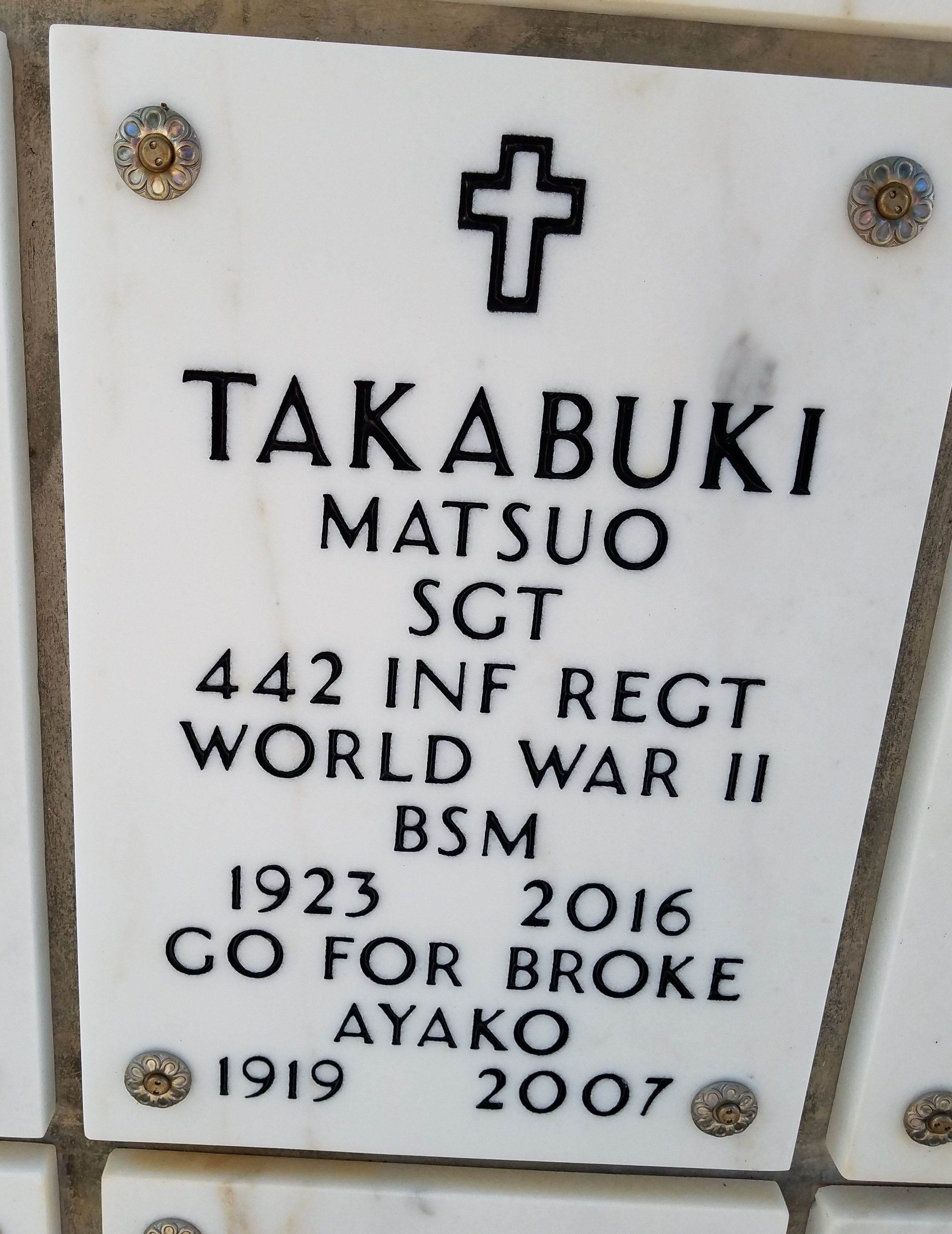He met the former Ayako "Aya" Saiki in 1943 during a weekend pass from military training in Chicago. Aya had been sent there to work for the government and support the war effort after first being sent to live in an internment camp in her home state of California. Matsy and Aya married in Chicago in 1946 and enjoyed 61 years of marriage before Aya passed away in 2007.
Takabuki earned his law degree from the University of Chicago in 1949. Upon his return to Hawaii, he served as an attorney for the Territorial Department of Labor from 1949 until 1952, when he went into private practice, working with businessman Chinn Ho on some of the largest financial and real estate deals in Hawai'i at the time, including the iconic Ilikai Hotel.
Takabuki was former Hawai'i governor John Burns' campaign manager and became his closest and most trusted advisor. Takabuki was part of the Democratic political revolution in Hawai'i, led by Burns, and included future U.S. senators Dan Inouye and Spark Matsunaga and future Hawai'i Supreme Court Chief Justice and Kamehameha Schools trustee William Richardson.
Takabuki and other returning veterans worked with Burns and the Democratic Party to bring about social and economic reform. Takabuki served as the chairman of the Democratic Party state convention in 1956. He was also elected to the Honolulu City Council, then known as the Board of Supervisors, and served for 16 years.
Takabuki's appointment to Kamehameha Schools' Board of Trustees in 1971 was not without controversy. Some said the appointment smacked of political cronyism; others lamented the fact that Takabuki was not of Hawaiian ancestry. More than 1,000 protesters marched in Waikiki against his appointment, and Kawaiaha'o Church chimed its bells in protest. Despite harsh criticism and threats, Takabuki said he would not back down because of his loyalty to Governor Burns and the Supreme Court Justices who appointed him.
As many who knew him recounted, Takabuki was fiercely loyal to his friends and those who believed in and supported him. This loyalty stemmed from deep rooted Asian values of obligation and duty, reinforced by experiences in combat with other members of the 442nd. As Trustee, Takabuki was recognized as being a financial genius who helped evolve Kamehameha Schools from a land-rich, cash-poor organization to the multi-billion-dollar charitable educational trust it is today. Under his leadership, Kamehameha Schools entered into a partnership with Wall Street powerhouse Goldman Sachs, with Kamehameha Schools investing approximately $500 million in Goldman between 1992 and 1994. By the time Kamehameha Schools sold its final stake in Goldman in 2002, the investment had generated proceeds of more than $2 billion for the trust.
During his tenure at Kamehameha Schools, Takabuki was a strong supporter of extending more of the school's educational resources beyond its single Kapalama campus, including bringing early childhood education programs and pre-school services to the neighbor islands. His strong belief in education as the foundation upon which lives are built and dreams are fulfilled was perfectly aligned with Princess Pauahi's desire for her people.
Upon his 1993 retirement at age 70 as required by the probate rules governing the trust, it was Takabuki's desire that a scholarship fund be established for post graduate education for students of Hawaiian ancestry. To date, over $550,000 has been awarded to enable these students to achieve their educational goals. By the time Takabuki retired from the trust after more than two decades, he had become a beloved "kupuna"-even his once harshest critics gave praise and extended warm appreciation for what he had done for the Hawaiian people. Upon his retirement in 1993, the Kawaiaha'o Church tolled its bells in tribute. Takabuki would later say that was one of the most meaningful tributes that he had ever received. In 1998, Takabuki documented many of his experiences in a 237-page autobiography entitled "An Unlikely Revolutionary: Matsuo Takabuki and the Making of Modern Hawai'i".
Takabuki is survived by three children, Glen, (Carolyn), Beth (Chris) and Anne Takabuki, and seven grandchildren, Chad, Todd and Cody Takabuki; Kristen, Justin and Remi Yamamoto, and Aysia Takabuki.
Described by his family as "A loving and devoted father and grandfather", Takabuki is dearly remembered by them for his strong work ethic, good nature and hearty laugh. "Dad was committed to providing opportunities for his family and all of the children of Hawai'i. His legacy, and the message he leaves for future generations is, that as long as you are willing to work hard, there is no limit---you can strive for and achieve your "Impossible Dream". Takabuki certainly did, and the children of Hawai'i today and for generations to come will be the beneficiaries of his dedication and hard work.
Services were held at the Kamehameha School Chapel. Donations were made by the family to the 442 Regimental Combat Team Foundation and the Pauahi Foundation benefiting early childhood education and literacy programs.
Arrangements Provided By: NUUANU MEMORIAL PARK & MORTUARY LLC
Source: Honolulu Star-Advertiser, March 31, 2017.
He met the former Ayako "Aya" Saiki in 1943 during a weekend pass from military training in Chicago. Aya had been sent there to work for the government and support the war effort after first being sent to live in an internment camp in her home state of California. Matsy and Aya married in Chicago in 1946 and enjoyed 61 years of marriage before Aya passed away in 2007.
Takabuki earned his law degree from the University of Chicago in 1949. Upon his return to Hawaii, he served as an attorney for the Territorial Department of Labor from 1949 until 1952, when he went into private practice, working with businessman Chinn Ho on some of the largest financial and real estate deals in Hawai'i at the time, including the iconic Ilikai Hotel.
Takabuki was former Hawai'i governor John Burns' campaign manager and became his closest and most trusted advisor. Takabuki was part of the Democratic political revolution in Hawai'i, led by Burns, and included future U.S. senators Dan Inouye and Spark Matsunaga and future Hawai'i Supreme Court Chief Justice and Kamehameha Schools trustee William Richardson.
Takabuki and other returning veterans worked with Burns and the Democratic Party to bring about social and economic reform. Takabuki served as the chairman of the Democratic Party state convention in 1956. He was also elected to the Honolulu City Council, then known as the Board of Supervisors, and served for 16 years.
Takabuki's appointment to Kamehameha Schools' Board of Trustees in 1971 was not without controversy. Some said the appointment smacked of political cronyism; others lamented the fact that Takabuki was not of Hawaiian ancestry. More than 1,000 protesters marched in Waikiki against his appointment, and Kawaiaha'o Church chimed its bells in protest. Despite harsh criticism and threats, Takabuki said he would not back down because of his loyalty to Governor Burns and the Supreme Court Justices who appointed him.
As many who knew him recounted, Takabuki was fiercely loyal to his friends and those who believed in and supported him. This loyalty stemmed from deep rooted Asian values of obligation and duty, reinforced by experiences in combat with other members of the 442nd. As Trustee, Takabuki was recognized as being a financial genius who helped evolve Kamehameha Schools from a land-rich, cash-poor organization to the multi-billion-dollar charitable educational trust it is today. Under his leadership, Kamehameha Schools entered into a partnership with Wall Street powerhouse Goldman Sachs, with Kamehameha Schools investing approximately $500 million in Goldman between 1992 and 1994. By the time Kamehameha Schools sold its final stake in Goldman in 2002, the investment had generated proceeds of more than $2 billion for the trust.
During his tenure at Kamehameha Schools, Takabuki was a strong supporter of extending more of the school's educational resources beyond its single Kapalama campus, including bringing early childhood education programs and pre-school services to the neighbor islands. His strong belief in education as the foundation upon which lives are built and dreams are fulfilled was perfectly aligned with Princess Pauahi's desire for her people.
Upon his 1993 retirement at age 70 as required by the probate rules governing the trust, it was Takabuki's desire that a scholarship fund be established for post graduate education for students of Hawaiian ancestry. To date, over $550,000 has been awarded to enable these students to achieve their educational goals. By the time Takabuki retired from the trust after more than two decades, he had become a beloved "kupuna"-even his once harshest critics gave praise and extended warm appreciation for what he had done for the Hawaiian people. Upon his retirement in 1993, the Kawaiaha'o Church tolled its bells in tribute. Takabuki would later say that was one of the most meaningful tributes that he had ever received. In 1998, Takabuki documented many of his experiences in a 237-page autobiography entitled "An Unlikely Revolutionary: Matsuo Takabuki and the Making of Modern Hawai'i".
Takabuki is survived by three children, Glen, (Carolyn), Beth (Chris) and Anne Takabuki, and seven grandchildren, Chad, Todd and Cody Takabuki; Kristen, Justin and Remi Yamamoto, and Aysia Takabuki.
Described by his family as "A loving and devoted father and grandfather", Takabuki is dearly remembered by them for his strong work ethic, good nature and hearty laugh. "Dad was committed to providing opportunities for his family and all of the children of Hawai'i. His legacy, and the message he leaves for future generations is, that as long as you are willing to work hard, there is no limit---you can strive for and achieve your "Impossible Dream". Takabuki certainly did, and the children of Hawai'i today and for generations to come will be the beneficiaries of his dedication and hard work.
Services were held at the Kamehameha School Chapel. Donations were made by the family to the 442 Regimental Combat Team Foundation and the Pauahi Foundation benefiting early childhood education and literacy programs.
Arrangements Provided By: NUUANU MEMORIAL PARK & MORTUARY LLC
Source: Honolulu Star-Advertiser, March 31, 2017.
Inscription
SGT
442 INF REGT
WORLD WAR II
BSM
GO FOR BROKE
Family Members
Sponsored by Ancestry
Advertisement
Records on Ancestry
Advertisement






